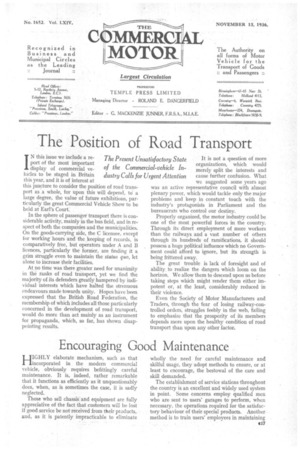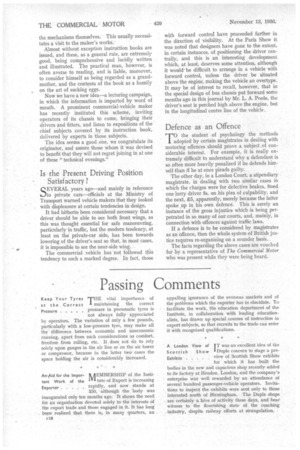Encouraging Good Maintenance
Page 71

Page 72

If you've noticed an error in this article please click here to report it so we can fix it.
HIGHLY elaborate mechanism, such as that 'incorporated in the modern commercial vehicle, obviously requires befittingly careful maintenance. It is, indeed, rather remarkable that it functions as efficiently as it unquestionably does, when, as is sometimes the case, it is sadly neglected.
Those who sell chassis and equipment are fully appreciative of the fact that customers will be lost if good service be not received from their products, and, as it is patently impracticable to eliminate wholly the need for careful maintenance and skilful usage, they adopt methods to ensure, or at least to encourage, the bestowal of the care and skill demanded.
The establishment of service stations throughout the country is an excellent and widely used system in point. Some concerns employ qualified men who are sent to users' garages to perform, when necessary, the operations required for the satisfactory behaviour of their special products. Another method is to train users' employees in maintaining the mechanisms themselves. This usually necessitates a visit to the efia,ker's works. Almost without exception instruation books are issued, and these, as a general rule, are extremely good, being comprehensive and lucidly written and illustrated. The practical man, however, is often averse to reading, and is liable, moreover, to consider himself as being regarded as a grandmother, and the contents of the book as a homily on the art of sucking eggs. Now we have a new idea—a lecturing campaign, in which the information is imparted by word of mouth. A prominent commercial-vehicle maker has recently instituted this scheme, inviting operators of its chassis to come, bringing their drivers and fitters, and listen to expositions of the chief subjects covered by its instruction book, delivered by experts in those subjects. The idea seems a good one, we congratulate its originator, and assure those whom it was devised to benefit that they will not regret joining in at one of these "technical evenings."
Is the Present Driving Position Satisfactory? SEVERAL years ago—and mainly in reference to private cars—officials at the Ministry of Transport warned vehicle makers that they looked with displeasure at certain tendencies in design. It had hitherto been considered necessary that a driver should be able to see both front wings, as this was thought essential for safe manoeuvring, particularly in traffic, but the modern tendency, at least on the private-car side, has been towards lowering of the driver's seat so that, in most cases, it is impossible to see the near-side wing. The commercial vehicle has not followed this tendency to such a marked degree. In fact, those with forward control have proceeded farther in the direction of visibility. At the Paris Show it was noted that designers have gone to the extent, in certain instances, of positioning the driver centrally, and this is an interesting development which, at least, deserves some attention, although it wouldbe difficult to arrange in a vehicle with forward control, unless the driver be situated above the engine, making the vehicle an overtype. It may be of interest to recall, however, that in the special design of bus chassis put forward some months ago in this journal by Mr. L. A. Poole, the driver's seat is perched high above the engine, but in the longitudinal centre line of the vehicle.
Defence as an Offence TO the student of psychology the methods adopted by certain magistrates in dealing with motoring offences should prove a subject .of considerable interest. For example, it is really extremely difficult to understand why a defendant is so often more heavily penalized if he defends himself than if he at once pleads guilty. The other day, in a London Court, a stipendiary magistrate, in dealing with two similar cases in which the charges were for defective brakes, fined one lorry driver 5s. on his plea of culpability, and the next, L5, apparently, merely because the latter spoke ,up in his own defence. This is surely an instance of the gross injustice which is being perpetrated in so many of our courts, and, mainly, in connection with offences against traffic laws. If a defence is to be considered by magistrates as an offence, then the whole system of British justice requires re-organizing on a sounder basis.. The facts regarding the above cases are vouched for by a representative of The Commercial Motor who was present while they were being heard.








































































































































































